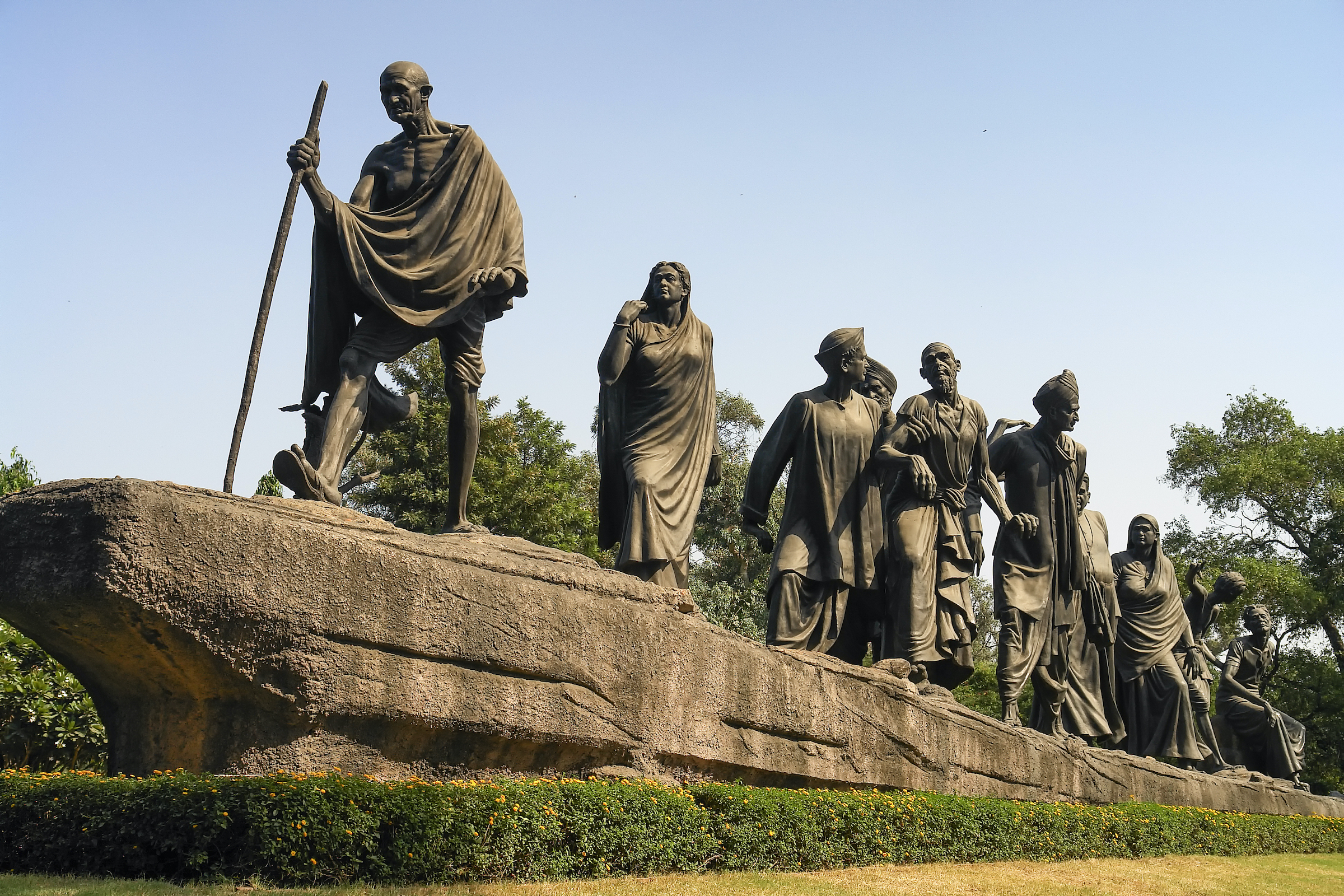Gandhi is often described as a leader. However, his leadership was peculiar. We normally think about people who lead as people moving ahead, forging ahead, advancing at the head of a kind of column – all militaristic metaphors – whereas Gandhi's idea of leadership was withdrawing, falling back, and in doing so, letting things open up, letting things happen. Therefore, it's not an accident that his most important terms, his categories (the categories he lived by and worked by) are all negative: non-violence, non-cooperation, non-possession. These are deliberately and explicitly negative words, negative because Gandhi was determined on making non-violent action a form of withdrawal rather than a version of leadership for advancement. For example, Gandhi often referred to one of the great Indian epics, the Mahabharat, which is like the Iliad, an epic of war, a fratricidal conflict. He used this epic to demonstrate what he describes as ‘evil itself depends upon goodness’. Gandhi viewed evil as a positive phenomenon, whereas goodness, in the form of non-violence or non-possession or non-cooperation, was a negative one.
Gandhi's leadership, vision of sacrifice and the ends of universalism
Professor of Indian History
- Gandhi was critical of the idea of humanitarianism, which he saw as empirical and non-political, and therefore disempowering.
- He is less popular than he once was, due to changing political climates and cultural shifts.
- Gandhi’s philosophies have relevance today in areas such as environmentalism and de-growth.
Peculiar leadership

Photo by Athur Simoes
Network of negatively conceived virtues
For instance, he described how evil prince Duryodhana’s army (in this epic) was only able to hold together because of these negative virtues of non-violence and non-cooperation, which often manifested in other forms of goodness. He argued that no matter how evil the Prince Duryodhana was his army could only cohere because it was brought together by the individual virtues of compassion, bravery, courage, friendship and duty – all of which were negative because they required withdrawing from Prince Duryodhana’s positive visions of conquest and vanquishing the enemy (and other things that determine the positive aims and objectives). Accordingly, even Prince Duryodhana's evil could only depend upon the goodness that was not positive because it could not be seen, literally. It resided in the everyday individual virtues of ordinary army members whose sacrifices, courage, bravery and friendship warranted the army’s survival. It was this invisible network of negatively conceived virtues, which were negative because they were never put on the banner of any leader, that virtue, goodness and non-violence made themselves manifest.
Empirical humanity?
Gandhi was critical about humanity as an ideal for several reasons. One is that the British Empire, like many other European empires, had defined its mission in humanitarian terms in order to legitimise imperial rule since the consent of its subjects could not justify it. Thus, the empire was there to perform a humanitarian act and in doing so, to civilise its subjects who might not otherwise be willing to be subjected to it. Humanitarianism functioned to eliminate the possibility of politics. Gandhi was appropriately suspicious of it on those grounds, but he was also suspicious of it because of its overweening and universalistic claims. He thought – and he wrote this in his manifesto of 1909 called Hind SwarÄj (Indian Home Rule) – that the idea of humanity was empirical. Humanity was a figure that could be cartographically counted, mapped out and used to measure demography. This idea only became possible through technology produced by industrial capitalism and deployed by imperial rule, European imperialism.
Moreover, this desire to map, locate, count and control had become essential to the idea of humanity. It also became critical for thinking about humanitarianism as a way to empirically manifest humanity. These were a couple of reasons why he was very uncomfortable with the idea of humanity and thought that humanitarianism should consist not in this hubristic enterprise of counting, mapping and serving, but rather in every day, individualised forms of sacrifice.
Similarity and similitude
There are those of us who belong to certain races who share similarity and similitude and those of us who don't. Gandhi didn’t see defining the human race itself in these terms as having a racist logic even if it includes everyone within it. All forms of defining the human, which are premised upon these ideas of similarity and similitude, he argued, have been historically violent: that sexual sharing is premised upon the subordination of women, that the sharing of food often results in the hunger of millions, that the sharing of language results in competition and destruction as much as it does in friendship and loyalty, etc.

Photo by Gajus
The important thing about the animal or the non-human life form is that we don’t share any of these things with the animal. We don’t have something in common. That relationship can be an ethical one that isn’t based on these anthropomorphising versions of similarity and similitude. Thus, what does it mean to have a relationship with the non-human that is not based on sharing food or sharing sex or sharing language? What results is a fascinating form of non-reciprocity because you can only extend compassion and sacrifice to the animal based on a radical ignorance; you cannot know what the animal thinks, wants or feels, or you can know it in only very minimal terms. This was crucial for Gandhi.
Gandhi’s dwindling popularity
It's been commonplace now for many decades since Gandhi's own death to see him as a great anticolonial leader. While he was that, he was also much more. It seems that the travails through which Gandhi's image is proceeding at the moment discount him as India's independence leader in several respects. For one thing, he's no longer as popular in India as he used to be. One reason for this is that the Indian nation-state has taken ownership of him, regardless of the government in power, and that he has become merely an icon of the State in India, and therefore someone worthy of being repudiated. The current Indian government is a Hindu nationalist government, which is not keen on Gandhi for ideological reasons. In all, Gandhi has been shifted off his pedestal slightly for these two reasons. Nevertheless, globally, he has been partially disparaged because he’s accused of being a racist during his time in South Africa, for instance. In recent decades, he has been accused by Indian feminists of being a sexist because of his views on women and treatment of his wife. He’s been accused of being many other things besides not least a caste-ist: someone who tried to maintain or so it is argued, upper-caste privilege.
An anarchist sensibility
He has become posthumously important as a thinker of non-violence, which he always was. Yet, now, nonviolence is no longer confined to anti-imperialism. It's no longer about the creation of new nation-states. Gandhi has moved well beyond this context. It is fascinating because Gandhi's had a highly contingent and even pragmatic relationship with the nation-state throughout his life. He described himself as a philosophical anarchist. He rejected the idea of the nation-state. He thought the State should be minimal if it should exist at all. He took the anarchist telos of a world in which human beings or societies govern themselves as his ideal. When he was asked what he thought of Lenin, Gandhi responded that he would begin where Lenin ends, which is to say, with the withering away of the State. Lenin put anarchism at the very end of Bolshevism, and Gandhi brought it to the very beginning. Consequently, I think it's this sort of anarchist sensibility that has survived Gandhi as the great anticolonial figure, and I believe it marks the future.
Speaking to our contemporary concerns

Photo by eamesBot
Gandhi is much more interesting to environmentalists today. He was critical from the late 19th century of this idea of industrial capitalism as a force of liberation, whether through bourgeois capitalism or through communism: the idea that somehow you would go through the evils of industrialism and come out on the other side with a utopian society. That idea was premised upon ever-increasing expansion and growth. Gandhi believed ever-increasing expansion and growth were deeply violent, even evil.
His vision of returning to the minimal, of sacrifice, what one might today call de-growth, speaks so much more to our own contemporary concerns with limitations, with the limits of our ecosystems and with the limitations of the globe itself as a site of action. Thus, human beings have managed to make the world the arena of their political and economic actions, so it no longer merely serves as a context. It is itself an object of human actions, meaning that we have been thrown back upon our own devices because we have understood this arena’s limitations. This is the thought with which Gandhi himself started, which is why he was so critical of universalistic enterprises; he saw in universalism itself the seed of its own destruction, insofar as universalism could not take the idea of limits and limitations seriously. What do you do when you accomplish the ends of universality? What happens then? That is how Gandhi started. He started with that question, which is one that we face today.
Discover more about
Mahatma Gandhi
Devji, F. (2012). The Impossible Indian: Gandhi and the temptation of violence. Harvard University Press.
Devji F., (2020). Without a Future: Gandhi, Childhood and Politics. E-International Relations.